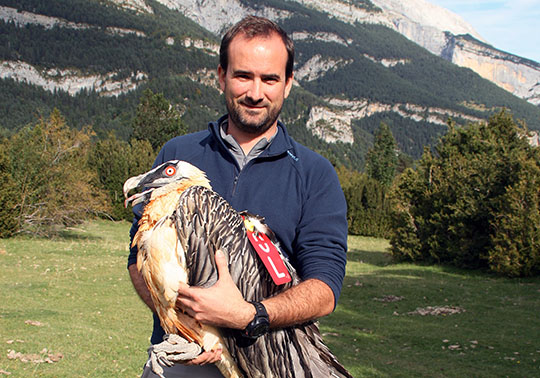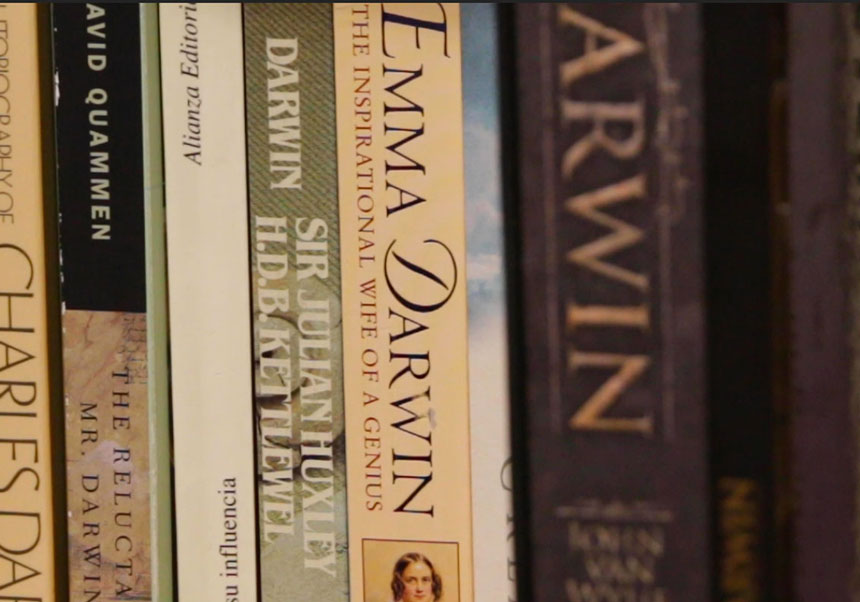Human action on environment restricts mammal movement and can alter ecosystems.
- Fundació Parc Científic
- January 26th, 2018

Mammals have their movements restricted in those environments that have been modified by humans. This is the conclusion of a research published in the cover front of the last number of Science by an international research team with the participation of the Instituto Cavanilles of the Universitat de València. It is located in the Science Park of the academic institution. This fact can have serious consequences to ecosystems and society.
Human action on environment restricts mammal movement and can alter ecosystems.
Mammals have their movements restricted in those environments that have been modified by humans. This is the conclusion of a research published in the cover front of the last number of Science by an international research team with the participation of the Instituto Cavanilles of the Universitat de València. It is located in the Science Park of the academic institution. This fact can have serious consequences to ecosystems and society.
When it comes to environments modified by humans, mammals tend to move in shorter distances (2 or three times shorter) than usual. This is the first time that this issue is studied at a global level, analysing the behaviour of different species at once. The authors of this study, led by German biologist Marlee Tucker (Senckenberg Research Centre on Biodiversity and Air Conditioning and Frankfurt Goethe University) have compiled data regarding the movement of 803 individuals from 57 mammal species from all around the World. Researcher Pascual López was among the researchers takin part in this study. Movebank data portal, which files animal movement data incorporated by international researchers, has been used.
The study includes different mammal species, from hares to boars and elephants. They are tracked by individual GPS disposals attached to them for at least two months. Researchers have compared this data with the Human Impact Index (infrastructures, settlements or agriculture) of animal movement study areas.
Results indicate that, during a 10-day period, mammals inhabiting highly human-modified environments (such as the European landscape) only move a third of the usual distance. Even so, the analysis indicates that in short-time periods (an hour, for instance) mammal movement is not significantly affected by the human activity. Most mammals move everyday searching for food, couple and shelter. Researchers are afraid that reduced travel distances can affect ecosystems functions that affect animal movements. “It is important that animals move because it allows important ecological characteristics. In addition, mammal movements permit the unique interaction of different food webs. If mammals reduce their movement, it could alter any ecosystem function” states Tucker.
“This mobility limitation among mammals in anthropogenic environments can have severe consequences in our specie” indicates Pascual López, postdoctoral researcher of the programme Juan de la Cierva at the Instituto Cavanilles de Biodiversidad y Biología Evolutiva (ICBiBE) of the Universitat de València and co-author of the study. “Mammals play an important role in the dynamic of ecosystems. They keep food webs, regulate the populations of other species, nutrient and seed transport or diseases transmission. In addition, mammals (especially predators) can ameliorate farming production by controlling plague species, easing control over mesopredators that harm species of economic interest (ranching, hunting activity, etc.) and controlling transmission and dissemination of diseases, given that they can reduce guest populations and species that act as contagion vectors.
This work has been published in the last number of Science.
Reference
Moving in the Anthropocene: Global reductions in terrestrial mammalian movements.
Marlee A. Tucker,1,2 Katrin Böhning-Gaese,1,2William F. Fagan,3,4 John Fryxell,5 Bram VanMoorter,6 Susan C. Alberts,7 Abdullahi H. Ali,8 Andrew M. Allen,9,10 Nina Attias,11 Tal Avgar,12 Hattie Bartlam-Brooks,13 Buuveibaatar Bayarbaatar,14 Jerrold L. Belant,15 Alessandra Bertassoni,16 Dean Beyer,17 Laura Bidner,18 Floris M. van Beest,19 Stephen Blake,20,21 Niels Blaum,22 Chloe Bracis,1,2 Danielle Brown,23 P. J. Nico de Bruyn,24 Francesca Cagnacci,25,26 Justin M. Calabrese,3,27 Constança Camilo-Alves,28,29 Simon Chamaillé-Jammes,30 Andre Chiaradia,31,32 Sarah C. Davidson,33,20 Todd Dennis,34 Stephen DeStefano,35 Duane Diefenbach,36 Iain Douglas-Hamilton,37,38 Julian Fennessy,39 Claudia Fichtel,40 Wolfgang Fiedler,20 Christina Fischer,41 Ilya Fischhoff,42 Christen H. Fleming,3,27 Adam T. Ford,43 Susanne A. Fritz,1,2 Benedikt Gehr,44 Jacob R. Goheen,45 Eliezer Gurarie,3,46 Mark Hebblewhite,47 Marco Heurich,48,49 A. J. Mark Hewison,50 Christian Hof,1 Edward Hurme,3 Lynne A. Isbell,18,51 René Janssen,52 Florian Jeltsch,22 Petra Kaczensky,6,53 Adam Kane,54 Peter Kappeler,40 Matthew Kauffman,55 Roland Kays,56,57 Duncan Kimuyu,58 Flavia Koch,40,59 Bart Kranstauber,44 Scott LaPoint,20,60 Peter Leimgruber,27 John D. C. Linnell,6 Pascual López-López,61 A. CatherineMarkham,62 JennyMattisson,6 Emilia Patricia Medici,63,64 UgoMellone,65 Evelyn Merrill,12 Guilherme deMirandaMourão,66 Ronaldo G.Morato,67 Nicolas Morellet,50 Thomas Morrison,68 Samuel L Díaz-Muñoz,69,70 Atle Mysterud,71 Dejid Nandintsetseg,1,2 Ran Nathan,72 Aidin Niamir,1 John Odden,73 Robert B. O’Hara,1,74 Luiz Gustavo R. Oliveira-Santos,75 Kirk A. Olson,14 Bruce D. Patterson,76 Rogerio Cunha de Paula,67 Luca Pedrotti,77 Björn Reineking,78,79 Martin Rimmler,80 Tracey L. Rogers,81 Christer Moe Rolandsen,6 Christopher S. Rosenberry,82 Daniel I. Rubenstein,83 Kamran Safi,20,84 Sonia Saïd,85 Nir Sapir,86 Hall Sawyer,87 Niels Martin Schmidt,19,88 Nuria Selva,89 Agnieszka Sergiel,89 Enkhtuvshin Shiilegdamba,14 João Paulo Silva,90,91,92 Navinder Singh,9 Erling J. Solberg,6 Orr Spiegel,93 Olav Strand,6 Siva Sundaresan,94 Wiebke Ullmann,22 Ulrich Voigt,95 Jake Wall,37 DavidWattles,35 Martin Wikelski,20,84 Christopher C.Wilmers,96 John W. Wilson,97 George Wittemyer,37,98 Filip Zięba,99 Tomasz Zwijacz-Kozica,99 Thomas Mueller1,2,27
More information:
File in: Ciencias de la Vida
















